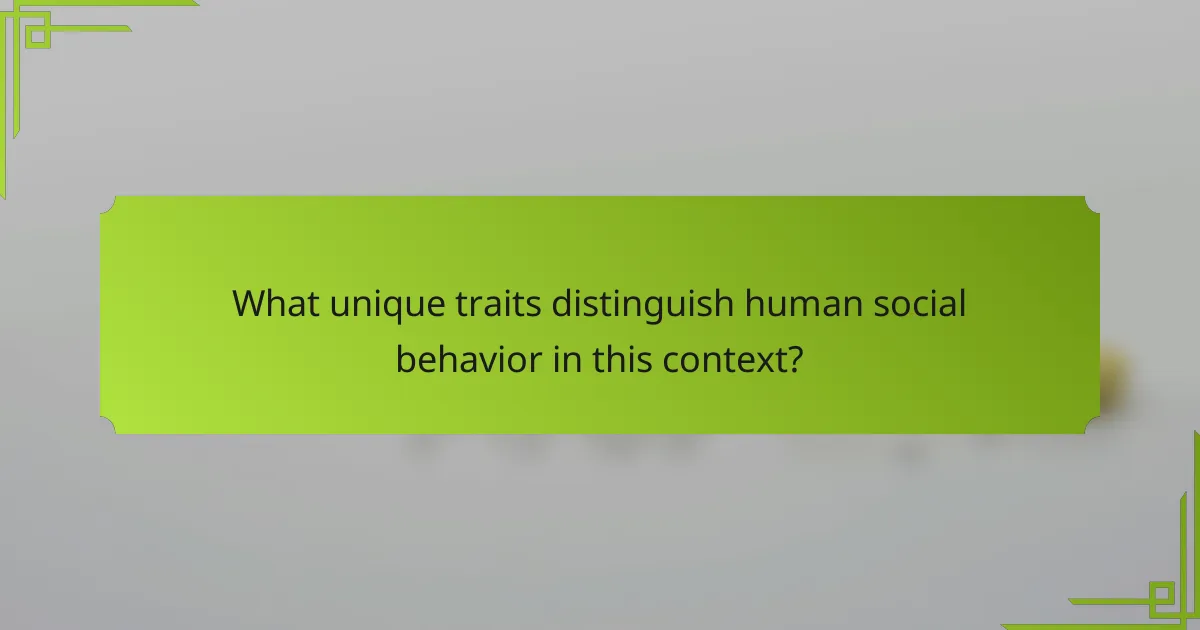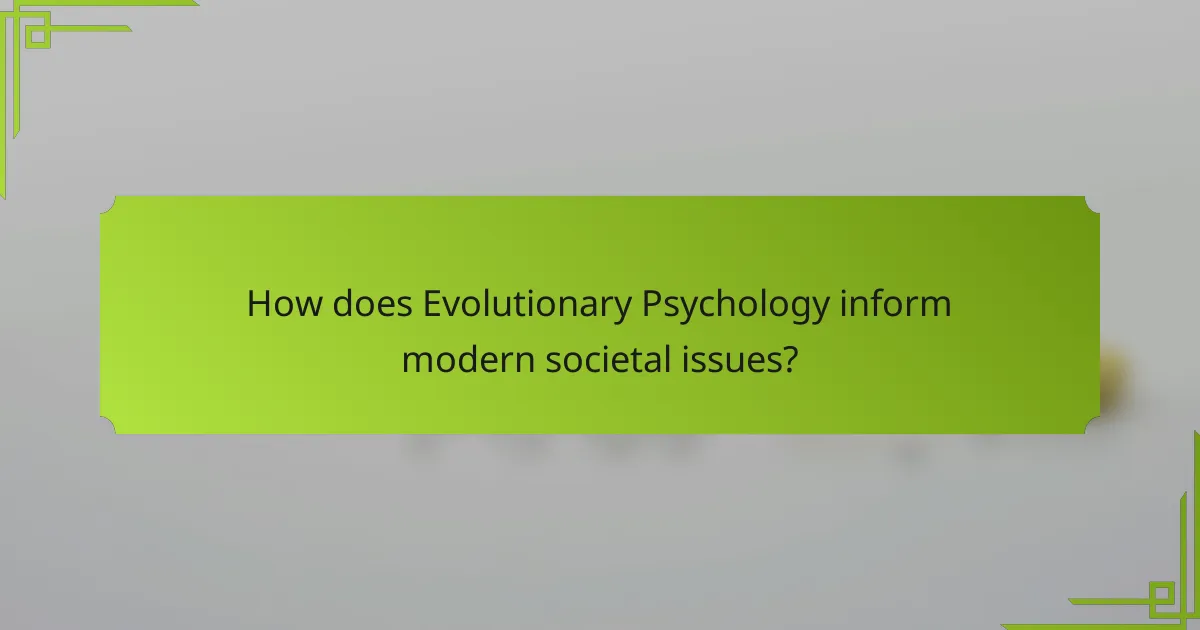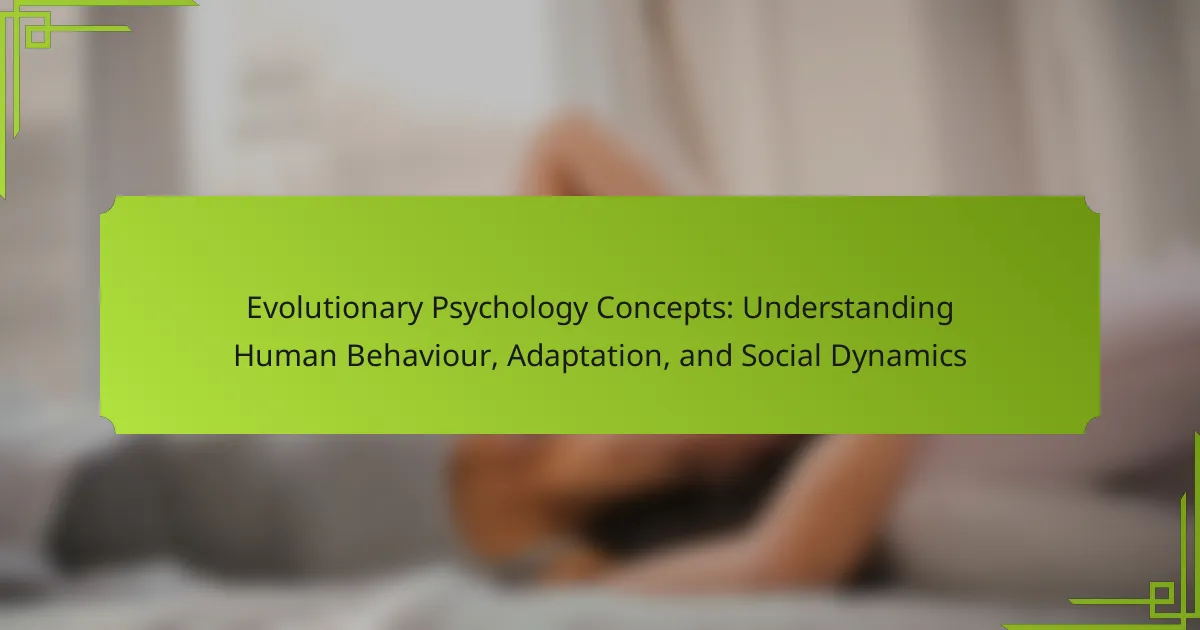Understanding human behavior through evolutionary psychology reveals insights into adaptation, social dynamics, and reproductive strategies. This article explores foundational principles, universal attributes, and the role of rare cultural traits. It also examines practical applications in mental health, education, and marketing, highlighting how these concepts can address contemporary societal issues.

What are the foundational principles of Evolutionary Psychology?
The foundational principles of evolutionary psychology focus on understanding human behavior through the lens of adaptation and social dynamics. These principles include the idea that many psychological traits are evolved adaptations to solve problems faced by our ancestors. The emphasis is on innate psychological mechanisms that influence behavior, cognition, and emotions. Key concepts include natural selection, sexual selection, and the role of environment in shaping behavior. These principles help explain the interplay between biology and culture in human development and social interaction.
How does natural selection influence human behavior?
Natural selection significantly shapes human behavior by favouring traits that enhance survival and reproductive success. This evolutionary process influences social dynamics, decision-making, and emotional responses.
For instance, traits such as cooperation and altruism may arise from the need for group cohesion, improving individual chances of survival. Human behaviours like aggression can also be understood through this lens, serving as adaptive responses in competitive environments.
Research in evolutionary psychology highlights how ancestral environments shaped modern behaviour patterns. Understanding these influences provides insights into why humans act in certain ways, revealing a complex interplay between biology and environment.
In summary, natural selection has a profound impact on human behavior, guiding the evolution of traits that promote adaptation and social interaction.
What role do adaptations play in shaping social dynamics?
Adaptations significantly influence social dynamics by shaping behaviours and interactions within groups. They enhance survival and reproductive success by promoting cooperation, communication, and social bonding. For example, traits like empathy and altruism facilitate group cohesion, leading to stronger social networks. Unique adaptations, such as cultural practices, further modify social structures, impacting conflict resolution and resource sharing. As a result, adaptations play a crucial role in determining how individuals navigate complex social environments.
What are the key theories in Evolutionary Psychology?
Evolutionary psychology posits that human behavior and cognition are shaped by evolutionary processes. Key theories include the adaptationist perspective, which suggests that psychological traits evolved to solve problems faced by our ancestors, and the concept of sexual selection, explaining mate choice and reproductive strategies. Another significant theory is the idea of parental investment, emphasizing the differing reproductive strategies of males and females. These theories collectively enhance our understanding of social dynamics and human behavior through an evolutionary lens.
How does the theory of parental investment explain mating strategies?
The theory of parental investment explains mating strategies by emphasizing how investment levels influence reproductive success. Higher investment from parents typically leads to greater offspring survival, shaping mate selection. For example, females often prefer mates that exhibit resources or commitment, reflecting their need for support in raising young. Conversely, males may prioritise quantity over quality, seeking multiple partners to enhance reproductive opportunities. This dynamic illustrates the trade-offs inherent in mating strategies, driven by evolutionary pressures on parental investment.
What insights does the theory of sexual selection provide?
The theory of sexual selection provides insights into mate preferences and competition among individuals. It explains how certain traits evolve to enhance reproductive success. For example, physical attributes like bright plumage in birds signal genetic fitness. Sexual selection also influences behaviours, such as courtship rituals, which enhance attraction and social dynamics. Understanding these aspects reveals how evolutionary pressures shape human behavior and social structures.

What are the universal attributes of human behavior in Evolutionary Psychology?
Human behavior in evolutionary psychology is characterised by universal attributes such as adaptation, social dynamics, and reproductive strategies. These attributes reflect how humans have evolved to survive and thrive in diverse environments. Adaptation involves behavioural changes in response to environmental pressures, enhancing survival and reproductive success. Social dynamics encompass group interactions, cooperation, and competition, which are essential for resource sharing and mate selection. Reproductive strategies include parental investment and mate preferences, influencing genetic propagation. Understanding these attributes provides insights into the underlying mechanisms of human behavior shaped by evolutionary processes.
How do emotions serve adaptive functions?
Emotions serve adaptive functions by influencing behaviour and decision-making in ways that enhance survival. They facilitate social bonding, promote communication, and help individuals respond to environmental challenges. For example, fear triggers a fight-or-flight response, while joy reinforces positive interactions. Emotions also guide moral judgments and foster group cohesion, essential for human adaptation in social contexts. Understanding these functions illustrates the evolutionary significance of emotional responses in shaping human behavior and social dynamics.
What common cognitive biases arise from evolutionary processes?
Cognitive biases arising from evolutionary processes include confirmation bias, in-group bias, and availability heuristic. These biases help individuals navigate social dynamics and make adaptive decisions.
Confirmation bias leads people to favour information that supports pre-existing beliefs, enhancing group cohesion. In-group bias promotes preferential treatment for members of one’s own group, fostering social bonds. The availability heuristic influences decision-making based on easily recalled examples, often skewing risk perception.
Understanding these biases reveals how human behavior is shaped by evolutionary adaptations to social environments.

What unique traits distinguish human social behavior in this context?
Human social behavior is distinguished by traits such as cooperation, empathy, and complex communication. These traits evolved to enhance group survival and foster social bonds. Unique attributes include altruism, which promotes group cohesion, and the ability to understand social hierarchies. Rare attributes, like the capacity for abstract thinking, enable humans to navigate intricate social landscapes. As a result, these traits significantly influence human interactions and societal structures.
How does cooperation evolve among humans?
Cooperation among humans evolves through social dynamics and adaptive behaviours. It is influenced by evolutionary psychology, which suggests that cooperation enhances survival and reproductive success. Humans develop trust and reciprocal relationships, fostering group cohesion. This evolution is marked by unique attributes such as altruism and empathy, which strengthen social bonds. As a result, cooperative behaviour becomes a fundamental aspect of human interaction.
What is the significance of altruism in social groups?
Altruism plays a crucial role in social groups by enhancing cooperation and group cohesion. This behaviour fosters trust and mutual support, leading to better survival rates for members. Altruism can be seen as a unique attribute of human evolution, promoting social bonding and collective action. Research indicates that altruistic behaviours can increase group success, benefiting individuals through reciprocal relationships.

What rare attributes can be observed in specific cultural contexts?
Rare attributes in specific cultural contexts include unique social norms, distinct mating strategies, and localized cognitive biases. These attributes shape behaviours and interactions, reflecting adaptations to environmental challenges. For instance, collectivist cultures may prioritise group harmony over individual achievement, influencing decision-making processes. Additionally, certain cultures exhibit rare emotional expressions that align with their historical experiences, affecting social dynamics and communication styles. Understanding these attributes enhances insights into human behavior and cultural adaptation.
How do cultural adaptations influence psychological traits?
Cultural adaptations significantly shape psychological traits by influencing behaviours, values, and social dynamics. These adaptations create unique environments that foster specific psychological responses tailored to societal needs. For instance, collectivist cultures often promote traits like cooperation and harmony, while individualistic cultures emphasise autonomy and self-expression. As a result, psychological traits are not fixed but evolve in response to cultural contexts, demonstrating the dynamic interplay between environment and human behavior.
What unique behaviors are observed in isolated populations?
Isolated populations exhibit unique behaviours due to environmental pressures and limited social interactions. These behaviours may include heightened cooperation, distinct communication methods, and unique cultural practices. For example, research indicates that isolation can lead to enhanced problem-solving abilities as communities adapt to specific challenges. Additionally, genetic drift often results in unique traits that influence social dynamics, such as increased altruism or specific mating strategies. Understanding these behaviours sheds light on human adaptation and evolution in diverse environments.

How does Evolutionary Psychology inform modern societal issues?
Evolutionary psychology provides insights into modern societal issues by explaining behaviours shaped by ancestral environments. It highlights how innate predispositions influence contemporary social dynamics, such as cooperation, aggression, and mate selection. These concepts help address challenges like social inequality and mental health by framing them within the context of human adaptation. Understanding these evolutionary roots can inform policies and interventions aimed at fostering social cohesion and addressing behavioural issues.
What insights can it provide on contemporary relationship dynamics?
Evolutionary psychology concepts provide insights into contemporary relationship dynamics by highlighting the influence of biological and social factors on behaviour. These principles explain how evolutionary adaptations shape mate selection, attachment styles, and conflict resolution. For example, understanding the role of evolutionary pressures can clarify why certain traits, such as resource acquisition and emotional support, are prioritised in relationships. Additionally, these concepts reveal how societal changes impact traditional dynamics, leading to new patterns in partnership formation and maintenance. By examining these aspects, individuals can better navigate and understand their relationships in a modern context.
How can understanding evolutionary roots aid in conflict resolution?
Understanding evolutionary roots can significantly enhance conflict resolution by providing insight into human behaviour and social dynamics. Recognising that many conflicts stem from deep-seated evolutionary instincts allows individuals to approach disagreements with empathy and awareness.
Evolutionary psychology suggests that behaviours such as aggression or cooperation are rooted in survival strategies. For example, understanding that competition for resources is a natural instinct can help individuals frame conflicts as opportunities for collaboration rather than confrontation.
Additionally, recognising the evolutionary basis of social hierarchies can aid in resolving power struggles. By addressing the underlying motivations tied to these instincts, parties can find common ground and foster mutual respect.
In summary, applying evolutionary psychology concepts to conflict resolution promotes a deeper understanding of human behaviour, enabling more effective and empathetic communication.

What practical applications can be derived from Evolutionary Psychology?
Evolutionary psychology offers practical applications in various fields, including mental health, education, and marketing. These applications leverage insights into human behaviour shaped by evolutionary processes.
In mental health, understanding evolutionary triggers for anxiety and depression can guide therapeutic approaches, enhancing treatment effectiveness. For example, recognising that certain fears are rooted in survival instincts can inform cognitive behavioural therapy techniques.
In education, evolutionary psychology can inform teaching methods that align with innate learning preferences, improving student engagement and retention. Techniques that incorporate social dynamics, such as collaborative learning, can foster a more effective educational environment.
In marketing, insights from evolutionary psychology can enhance consumer behaviour analysis. Understanding innate preferences and social influences can lead to more targeted advertising strategies, ultimately increasing conversion rates.
These applications illustrate how evolutionary psychology concepts can be practically applied to improve human interactions and decision-making across various domains.
How can knowledge of evolutionary principles enhance personal development?
Understanding evolutionary principles enhances personal development by revealing how human behaviour is shaped by adaptation and social dynamics. This knowledge fosters self-awareness, allowing individuals to recognise inherited traits and behaviours that influence their decisions.
By applying evolutionary psychology concepts, individuals can identify patterns in their social interactions, enhancing relationships and communication skills. For instance, recognising the evolutionary basis of competition and cooperation can lead to more effective teamwork and conflict resolution.
Additionally, understanding the adaptive significance of certain behaviours can motivate personal change. Individuals may adopt healthier habits by recognising the evolutionary benefits of well-being and social bonding. This perspective encourages proactive growth and resilience in facing life’s challenges.
Incorporating these insights into daily life can lead to improved emotional intelligence and decision-making, ultimately facilitating a more fulfilling personal development journey.
What are the best practices for applying these concepts in everyday life?
Applying evolutionary psychology concepts in everyday life involves understanding human behaviour and social dynamics. Focus on self-awareness, recognise innate motivations, and adapt to social environments.
1. Enhance self-awareness by reflecting on personal behaviours and triggers influenced by evolutionary factors.
2. Build stronger relationships by acknowledging the social dynamics that govern interactions, such as cooperation and competition.
3. Use insights from evolutionary psychology to improve decision-making, considering how adaptive behaviours shape choices.
4. Foster empathy by understanding the evolutionary roots of emotions, which can enhance interpersonal connections.
What common mistakes should be avoided when interpreting human behavior?
Common mistakes to avoid when interpreting human behaviour include overgeneralisation, confirmation bias, neglecting context, and ignoring evolutionary influences. Overgeneralisation leads to inaccurate assumptions about individuals based on group behaviour. Confirmation bias skews interpretation by favouring information that aligns with preconceived notions. Neglecting context can result in misunderstandings of actions and motivations. Finally, ignoring evolutionary influences overlooks the adaptive significance of certain behaviours in social dynamics.
How can insights from Evolutionary Psychology optimize interpersonal relationships?
Insights from Evolutionary Psychology can enhance interpersonal relationships by revealing underlying motivations and behaviours. Understanding concepts like kin selection and mate selection helps individuals navigate social dynamics effectively. These insights can improve empathy, communication, and conflict resolution. For example, recognising that people often prioritise close relationships due to evolutionary benefits fosters stronger bonds. Additionally, awareness of adaptive behaviours allows for better responses to social cues, enhancing relational satisfaction. Ultimately, applying these principles can lead to healthier, more fulfilling connections.
